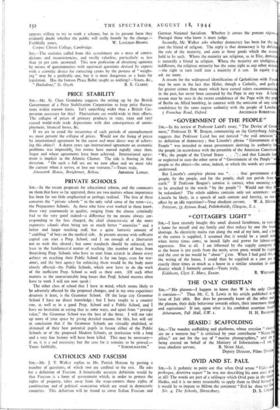CATHOLICS AND FASCISM
Snt,—Mr. J. V. Walker replies to Mr. Patrick Henson by putting a number of questions, of which two are cardinal to the rest. He asks for a definition of Fascism. A historically accurate definition would be that Fascism is a form of government which, in order to -protect the rights of property, takes away from the wage-earners those rights of combination and of political association which are usual in democratic countries. This definition will be found to cover Italian Fascism and
German National Socialism. Whether it covers -the present regime Portugal those who know .it must judge.
Secondly, Mr. Walker asks whether democracy has been for the part the friend of religion. The reply is that democracy is by defini the rule of the majority, and aims at those goods which the major, hold to be such: Where the majority are religious, as in Eire, democ is naturally a friend to religion. Where the majority are irreligious indifferent, the religious minority has the same right as any other minor —the right to turn itself into a majority if it can. In equity it ask no more.
A reason for the widespread identification of Catholicism with Fasc may be seen in the fact that Hitler, thOugh a Catholic, and guilty far greater crimes than many which have earned rulers exconununicau in the past, has never been censured by the Pope in any way. A fun reason may be seen in the recent condolence of the Pope with the per of Berlin on Allied bombing, in contrast with the omission of any sin condolence by the same august authority with the people of London






















 Previous page
Previous page